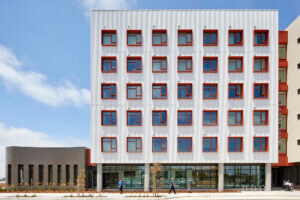In an effort to curb the spread of the novel coronavirus (COVID-19) and prevent hospitals from becoming overwhelmed, San Francisco Controller Ben Rosenfield announced last week that the city plans to secure 5,000 additional hotel rooms as a means of protecting and isolating unhoused individuals. This particularly vulnerable segment of the city’s population that has so far been exempt from the city’s shelter-in-place orders enacted on March 17.
As reported by Bay Area public radio station KALW, San Francisco has already leased or plans to lease nearly 2,000 hotel rooms to house the homeless. The city is expending an average of $200 per night for these rooms, a rate that includes security, cleaning, and other support services. The emergency ordinance introduced last week—which was voted on and approved unanimously today—by the city’s Board of Supervisors means that a total of 7,000 total hotel rooms will be used exclusively to provide shelter to the unsheltered during the pandemic.
This figure is enough to accommodate a large majority of the city’s homeless.population, believed to be over 8,000 people. With tourism and business travel all but halted for the unseen future, there were 30,000 unoccupied hotel rooms spread across San Francisco as of late March according to Business Insider.
“If we are successful with everyone in San Francisco who is housed, but not everyone who is unhoused, we will be putting everyone in danger,” the San Francisco Chronicle reported Supervisor Matt Haney as saying before the ordinance was passed.
The hotel room leases will last for 90 days. Based on the city’s previous average cost-per-night estimates, this brings the total cost of implementing the ordinance to $105 million. The ordinance, however, also smartly requires that 750 hotel rooms be earmarked for first responders and medical workers who have been exposed to or infected by the virus and another 500 hotel rooms to be set aside as post-treatment quarantine spaces for the general population. This increases the cost, as estimated by the city’s Budget and Legislative Analyst’s Office, to $58.6 million per month according to the Chronicle. The Federal Emergency Management Agency and California’s Office of Emergency Services will reimburse the city for a portion of the costs.
The legislation requires that the hotel rooms, numbering 8,250 in total, be available by April 26, which is around the same time that the number of reported coronavirus cases is expected to surge in California wrote the San Francisco Examiner. San Francisco Mayor London Breed, who has been vocal about the logistical challenges presented by the task at hand while also coming under intense scrutiny from several members of the Board, has a week to either approve or veto the Board of Supervisor’s emergency ordinance. If Breed does ultimately veto it, the board can override her vote and move the ordinance forward although this would result in a delay.
Dear Mayor @LondonBreed,
Today, the Board of Supervisors spoke for our city and unanimously passed an emergency hotel ordinance. We urge you to sign it now and save thousands of homeless San Franciscans from being infected by COVID19.
Sincerely,
San Francisco— Coalition on Homelessness (@TheCoalitionSF) April 15, 2020
Breed’s administration has been subject to public censure in recent days for its now-scrapped plans to move unhoused people into the Palace of Fine Arts and the Moscone Center, both of which were swiftly converted into makeshift coronavirus shelters earlier this month with room to accommodate 165 and 390 people, respectively. Housing activists and Supervisors alike raised concerns about the size and safety of the facilities, which included limited bathrooms and hand-washing stations, and, in general, seemed like “a very bad idea” as Haney put it. The uproar resulted in an abrupt about-face from the city, which then began to relocate unhoused individuals into the initial round of 2,000 available hotel rooms. To date, 780 people have moved into them.
“We have the hotel rooms, we have the staffing, why wouldn’t we do this right now and save thousands of lives,” said Supervisor Hillary Ronen during a press conference held last Friday. “We have been given every excuse in the book why this isn’t possible.”
Shortly after the emergency hotel ordinance was first announced, one of San Francisco’s largest homeless shelters, the MSC South Shelter, experienced a major outbreak in which 91 people, including a handful of staffers, tested positive for the virus. Over 400 people were cleared from the shelter and have been placed in hotel rooms, a move that Haney says should have happened weeks, even months, ago. “We’ve been getting a new excuse every week as to why they can’t do this,” he told NBC Bay Area. The city plans to reopen the MSC South and transformed it into a recovery center for shelter guests who previously tested positive after it is fully sanitized. The outbreak at MSC South is being depicted as one that was largely preventable.
Outside of San Francisco, New York is also beginning to move its homeless population into unoccupied hotel rooms. Mayor de Blasio announced during a weekend press conference that 2,5000 unhoused individuals will be relocated from shelters to hotels over the course of this week. Like in San Francisco, priority will be given to the elderly and individuals with preexisting health conditions or those who are experiencing symptoms of or have tested positive for the virus.
“Some shelters have a lot of space, some do not,” said de Blasio, who has come under increasing pressure from advocacy groups and health professionals to free up the city’s massive inventory of available hotel rooms to the unsheltered. “Where it’s clear to our Department of Social Services and our Department of Homeless Services that social distancing cannot be achieved properly, a number of those clients will be moved to hotels to achieve the balance, to make sure there is the proper social distancing.”











